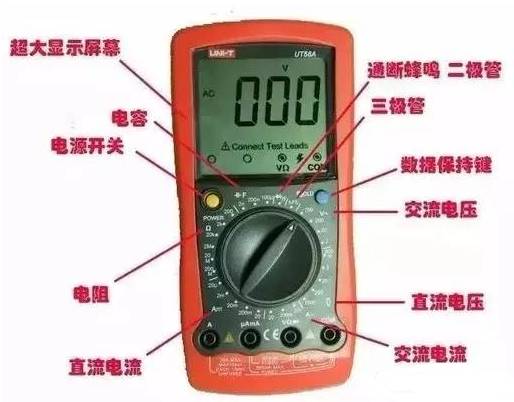
Correctly using a multimeter can quickly and accurately identify faults, and prevent damage to both electrical devices and the multimeter itself.
1. Check Range Before Measuring Every time you pick up the probes to measure, always double-check whether the measurement category and range selection switch are set correctly. For safety, this habit must be developed.
2. Do Not Change Range During Measurement Do not arbitrarily adjust the selection knob during measurement, especially when measuring high voltage (like 220V) or large current (like 0.5A), to avoid generating an arc, which could burn out the switch contacts. After measuring, set the range selection switch to the “•” position.
3. Keep the Dial Level, Align the Reading When using a multimeter, it should be rotated to a level position, and the line of sight should be directly aligned with the needle when reading.
4. Choose Appropriate Range, Needle Should Deflect Over Half When selecting a range, if you cannot estimate the size of the measurement beforehand, try to select a larger range first, then gradually switch to a smaller range based on the deflection angle, until the needle deflects about 2/3 of the full scale.
5. Do Not Measure Resistance While Powered, Discharge Capacitors First It is strictly forbidden to measure resistance when the circuit is live. When checking large capacitors on electrical equipment, discharge the capacitor before measuring. Click to download a wealth of engineering materials for free.
6. Adjust to Zero Before Measuring Resistance, Zero When Changing Range When measuring resistance, first turn the switch to the resistance range, short the two probes, and adjust the “Ω” zero potentiometer so that the needle points to zero ohms before measuring. Each time you change the resistance range, you should re-adjust the ohm zero point.
7. Remember Black is Negative, Black Connects to “+” Inside the Meter The red probe is positive, and the black probe is negative, but in resistance mode, the black probe connects to the internal battery’s positive terminal.
8. Measure Current in Series, Measure Voltage in Parallel When measuring current, the multimeter should be connected in series with the circuit being measured; when measuring voltage, the multimeter should be connected in parallel across the circuit.
9. Do Not Reverse Polarity, Develop a One-Handed Habit When measuring current and voltage, pay special attention not to reverse the polarity of the red and black probes, and always develop a one-handed operation habit to ensure safety.
2017 Most Popular Engineering WeChat Recommendations
★ Long press the QR code and select “Recognize the QR code in the image” to follow.
Free Material Download
WeChat ID: yyss365365
Description: Download a wealth of engineering materials for free!

▲ Long press the QR code to follow

Comprehensive Engineering
WeChat ID: zaojia369
Description: Daily updates of good articles from [Comprehensive Engineering]! Sharing good articles every day!

▲ Long press the QR code to follow

Engineering Construction Technology
WeChat ID: gmz100
Description: Providing you with knowledge, information, and insights on engineering construction!

▲ Long press the QR code to follow

Inspirational Journey
WeChat ID: lizhi567895
Description: We do not want empty platitudes, but we need a spirit of hard work that lights up our lives!

▲ Long press the QR code to follow

Engineering Resources
WeChat ID: xuezaojia365
Description: A professional sharing platform for standards, specifications, drawings, and engineering study materials.

▲ Long press the QR code to follow

Construction Cost
WeChat ID: zaojia360
Description: A platform for learning and exchanging knowledge about construction project costs.

▲ Long press the QR code to follow